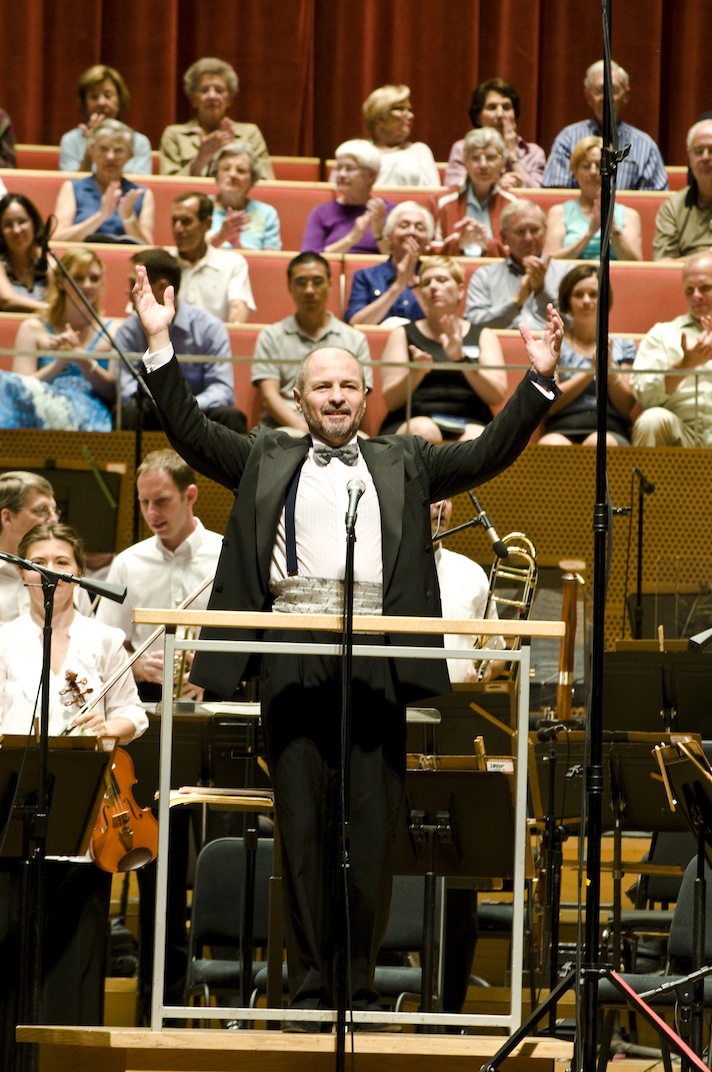Viva Mexico! Barrios and Grant Park Orchestra deliver a lively night of Mexican music

The Grant Park Music Festival did its part for this year’s Mexican 2010 celebration, marking the anniversary of Mexican independence with a program of that nation’s music, led by Enrique Barrios Saturday night at the Pritzker Pavilion.
The primary quality characterizing Mexican classical music is its close identification with the dance, and, to be sure, there was plenty of that colorful, rhythmically vital element on display. Yet the well-rounded program served up by Barrios and the Grant Park Orchestra showcased a bracing variety of music from our neighbor south of the border.
The evening got off to a rousing start with Huapango by José Pablo Moncayo. The 1941 work mines three of the title Spanish-derived dances into a broadly sweeping main section reminiscent of American Western film scores. Barrios led a swaggering performance that brought fine clarity to Moncayo’s complex rhythms, with notable solo contributions from Grant Park harpist Kayo Ishimaru-Fleisher.
Mariachi bands have long formed a festive part of Mexico’s musical culture. Blas Galindo’s Sones de Mariachi retools three of the most popular mariachi songs (La Negra, El Zopilote, and Los Cuatros Reales) and this 1941 symphonic version remains Galindo’s most popular work. Here too the sharply rhythmic dance element is to the fore, and Galindo’s uninhibited scoring underlines the whirlwind energy, with an unplanned police siren adding to the al fresco craziness.
For most of the 20th century, Carlos Chavez was the principal—perhaps the only—Mexican composer regularly featured on American concert programs, in no small part due to the committed advocacy of his great friend, Aaron Copland.
Despite its title, Chavez’s Sinfonia India (Symphony No. 2) is less ambitious in scale, a 12-minute single movement that draws its inspiration from several melodies of the Seri and Yaqui Indians of Sonora and the Huicholes of Nayarit. The lyrical Yaqui second theme has some of Copland’s homespun simplicity, and Barrios and the musicians put across the rhythmic insistence of the folk inspiration with bracing vigor.
Aptly following the Chavez symphony, Humberto Hernandez-Medrano’s Homenaje de Copland pays tribute to the American composer in a tightly packed eight minutes. The grand opening flourish is followed by a broad passacagalia-like theme for strings, and the tribute closes with a declamatory coda that seems to echo the stately dignity of Fanfare for the Common Man.
More individual was another homage, Silvestre Revueltas’ Homenaje a Federico Garcia Lorca, as one would expect from the wild man of Mexican music, whose dissolute lifestyle led to an early death at 40.
Though ostensibly a tribute to the great Spanish poet, Revuletas’s hommage is Mexican to the bone. There are snatches of dissonant mariachi music in which Revueltas seems to simultaneously pay tribute to the national style while wickedly satirizing it. Most striking is the brooding middle section that goes beyond the dance tropes to convey a dark desolation and an ephemeral sense of passing time in the tick-tock of piano and strings, with David Gordon contributing an evocative solo in the long trumpet cantilena.
Born in Mexico, Samuel Zyman has been a Juilliard faculty member for over a decade. His Encuentros was commissioned by Televisa for the Mexican pavilion at Seville’s Expo ’92. The brief work artfully mixes a striding Olympics-style theme with some lovely lyrical writing for flute and violin, given sensitive advocacy by Jennifer Lawson and Jeremy Black.
Arturo Marquez’s popular Danzon No 2 made an apt closer with its colorful scoring and rhythmic panache. As was the case for the entire program, Barrios drew playing of great clarity and rhythmic point from the Grant Park musicians, never whipping up the music for mere speed and volume, and allowing the music of his countrymen to speak eloquently for itself.
Note: Some of the works performed on Saturday’s Grant Park program are featured on the debut recording by conductor Alondra de la Parra of Mexican music (Sony). Check out the CD page of The Classical Review later this week for a look at this new recording.
Posted in Uncategorized




